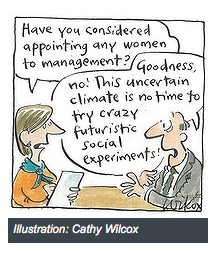
In spite of decades of research identifying organizational barriers to women's advancement and strong business cases for getting more women into leadership positions, we continue to run into organizations (sadly often HR executives) who resist calls to take action to close the gender gap.
One organization we know of treated their women's initiative leaders in the same way that our colleagues were treated back in the 1970s (when women's initiatives WERE a "futuristic social experiment").

If, as you advocate for starting or strengthening your women's initiative, you're running into roadblocks from management, here are 3 of most common reasons we hear for hesitance - and counter arguments you can make.
1. We don't want to treat women differently.
Really? The fact that the higher in the management chain the lower the percentages of women indicates that the organization is already treating women differently. In one study McKinsey study in EMEA, researchers found that men are 3 times more likely to get promoted from individual contributor into management and then 2 - 5 times more likely to move from there into senior/executive positions.
So, women ARE already being treated differently - to their disadvantage. Why? Our research shows that more men than women get the informal mentoring they need to rise to the top, the sponsorship they need to gain key experiences and the assumptions of competence needed to warrant this mentorship and sponsorship.
Another variation of this objection is that they don't want men to think that women are defective and need remedial treatment.
Women aren't defective, the systems that advance people are (see above and below). Which is why women often need to hear, through targeted women-specific interventions, the guidance that men already get informally.
2. We don't want to alienate the men by appearing to practice "reverse discrimination."
We actually heard a male manager say, "I think that if I give a job to a qualified woman, I'm discriminating against men."
No, this wasn't in the 1970s, it was in 2014! And he reflects one of many mindsets of managers that companies have to deal with if they want to make further progress on taking women to the top.
Paying attention to statistics for women's advancement is like attending to any other organizational goal - it's not reverse discrimination. If the company isn't meeting targets, it should be motivated to understand why and take the right corrective action. Women's advancement is not just a women's challenge, it's also an organizational culture/systems challenge and an individual challenge for managers.
3. We don't need it, our leadership programs are great!
Chances are that your leadership programs ARE great...for men.
You may believe that your leadership development programs are gender-neutral, but our research tells us that most are not...because they advantage men by over-emphasizing the interpersonal and team skills that men need.








